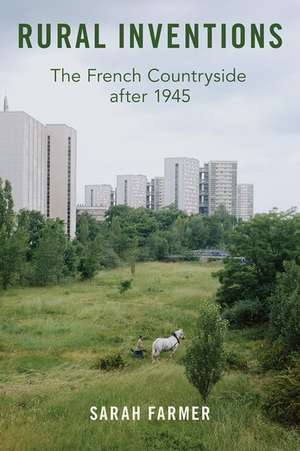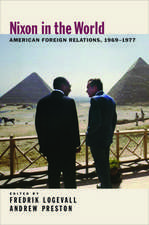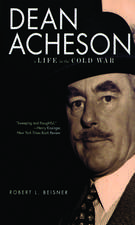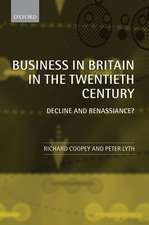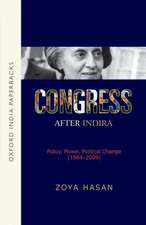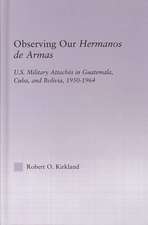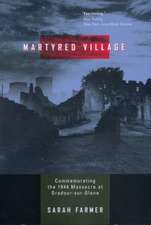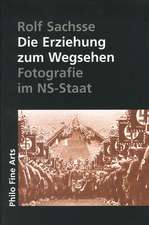Rural Inventions: The French Countryside after 1945
Autor Sarah Farmeren Limba Engleză Hardback – 22 apr 2020
Preț: 320.06 lei
Preț vechi: 391.25 lei
-18% Nou
Puncte Express: 480
Preț estimativ în valută:
61.26€ • 66.57$ • 51.49£
61.26€ • 66.57$ • 51.49£
Carte disponibilă
Livrare economică 20-26 martie
Preluare comenzi: 021 569.72.76
Specificații
ISBN-13: 9780190079079
ISBN-10: 019007907X
Pagini: 200
Ilustrații: 31 illustrations
Dimensiuni: 236 x 160 x 23 mm
Greutate: 0.43 kg
Editura: Oxford University Press
Colecția OUP USA
Locul publicării:New York, United States
ISBN-10: 019007907X
Pagini: 200
Ilustrații: 31 illustrations
Dimensiuni: 236 x 160 x 23 mm
Greutate: 0.43 kg
Editura: Oxford University Press
Colecția OUP USA
Locul publicării:New York, United States
Recenzii
In this beautifully written account of postwar urban-rural relations, Sarah Farmer pushes back against declensionist 'vanishing peasant' narratives and argues that the give-and-take between rural and urban France led to renewal and transformation rather than decline and decay. From rural men and women who purchased washing machines and joined the environmental movement, to the urban French who sought refuge from the city by way of peasant memoirs and country homes, Farmer persuasively argues for connection rather than dislocation....This is a must-read for anyone working on the period in France. It will also speak to scholars of other geographical areas as a comparative, given the foundational nature of questions surrounding urban-rural relations, agricultural industrialization, and modernity. Lastly, its length and transparent prose mean that it would be suitable for both undergraduate and graduate teaching.
Rural Inventions is a highly original study of a well-trodden subject: the decline of peasant society and culture associated with the post-war rural exodus and the subsequent transformation of the French countryside. Its originality derives from its multi-disciplinary approach that draws on a vast body of work not only by rural sociologists, historians, geographers and social scientists, but also by specialists in visual representation.
Farmer captures an especially important moment in urban-rural relations and presents four original case studies....In exploring why so many of us are drawn to the rural long after its seeming eclipse, Farmer skillfully illuminates how we continue to reinvent the rural in our contemporary world.
In a compelling and timely treat for historians of modern France, Farmer's book explores the complex relationship between city and countryside, the renegotiation of these spaces in the post-war world, and the often controversial migrations between the two. What emerges is not a picture of a forgotten countryside, but one continually rediscovered by waves of French people seeking to combine the charms of rural life with the desires of consumer society....This excellent book will appeal to anyone interested in understanding the figure of the 'peasant' not as an object to be modernised or reformed, but instead as sometime 'stewards of the natural world' and as active discussants in the complex, layered and ongoing debate about France's relationship to its terroir.
[In] this wide-ranging work...Farmer details the transformation of the...sparsely-populated countryside into a land of dynamic developments, which today constitutes an essential component of contemporary French life....Farmer's work discusses numerous examples of rural development and considers implications for the nation as a whole. This informative and insightful work will interest any student of rural French culture.
Rural Inventions explores the modernization of the French countryside after 1945, as consolidation of agricultural holdings pushed rural people into rapidly expanding cities. Challenging the old binary of presumably modern cities and backward provinces, Farmer explores how rural areas adapted to the changes....This short, accessible book, featuring excellent illustrations, reveals a symbiotic relationship between urban and rural France in a format that will appeal to students as well as scholars.
Sarah Farmer knows rural France very well. In this compelling, innovative, and thoughtful study, she lays out what has changed in the countryside, for better or for worse.
In this stunning new history of the French countryside after the Second World War, Sarah Farmer takes us far beyond our usual picture of rural exodus and the much-lamented disappearance of 'peasant civilization.' She reveals a world of teeming creativity, tumult, and reinvention as innovative young farmers, New Left utopians, second-home urbanites, and 'neo-rural' ecologists remade the economic and cultural landscape of rural France. A masterful study, full in arresting insights, and a great pleasure to read.
Rural Inventions is a path-breaking history of the urban dwellers in the first decades of the Fifth Republic who thought about the countryside, dreamed about it, and in some cases moved to it, and how this transformed rural France. Some bought second homes; others fought for environmental causes or established communes and organic farms. Sarah Farmer shows that nostalgia for a past defined in terms of place by those who did not originally live there was an engine of change in the countryside. Yet if the city folk experiencing this nostalgia were to see themselves in the picture, this would spoil it for them. This is why they are the absent presence in accounts of postwar rural France. Farmer reveals this presence and its importance.
France's postwar economic boom transformed the face of the countryside. When growth came to grinding halt in the 1970s, writers and artists reflected on what 'modernization' had done to la France profonde. It was a debate steeped in nostalgia but also one generative of schemes to reimagine what rural living was all about. This is a subject of real significance, which Farmer handles deftly and with an engaging sympathy.
This is a magisterial piece of scholarship that breaks new ground by providing a wide-ranging, multi-dimensional perspective on the changes that have affected rural France since World War II. What makes this book extraordinary is the sheer sweep of the analysis conducted by Sarah Farmer and the depth of erudition that she brings to it. Farmer seems equally at home in the musty archives of the Bibliothèque Nationale, the films of the Ministry of Agriculture, the popular TV shows and magazines in which rural themes arose, and the immense scholarly and popular literature that rural France has generated over the past hundred years.
Short, sparkling... Rural Inventions examines how and why peasants remained at the heart of French society's self-understanding long after this social group was reduced to a small portion of the population.... Farmer writes with clarity, poise, and economy. Part social history of rural society, part cultural history of its inhabitants, Farmer's book abounds with insights on how to study the countryside... The great merit of Farmer's book is to remind us that the history of postwar rural society cannot be reduced to the decline of peasant civilization or to the transformation of agriculture... By highlighting the centrality of the countryside to postwar France, Farmer opens illuminating vistas for historians whose gaze is too often directed at the urban.
Rural Inventions is composed of a series of tightly researched essays that fit together remarkably.
Rural Inventions is a highly original study of a well-trodden subject: the decline of peasant society and culture associated with the post-war rural exodus and the subsequent transformation of the French countryside. Its originality derives from its multi-disciplinary approach that draws on a vast body of work not only by rural sociologists, historians, geographers and social scientists, but also by specialists in visual representation.
Farmer captures an especially important moment in urban-rural relations and presents four original case studies....In exploring why so many of us are drawn to the rural long after its seeming eclipse, Farmer skillfully illuminates how we continue to reinvent the rural in our contemporary world.
In a compelling and timely treat for historians of modern France, Farmer's book explores the complex relationship between city and countryside, the renegotiation of these spaces in the post-war world, and the often controversial migrations between the two. What emerges is not a picture of a forgotten countryside, but one continually rediscovered by waves of French people seeking to combine the charms of rural life with the desires of consumer society....This excellent book will appeal to anyone interested in understanding the figure of the 'peasant' not as an object to be modernised or reformed, but instead as sometime 'stewards of the natural world' and as active discussants in the complex, layered and ongoing debate about France's relationship to its terroir.
[In] this wide-ranging work...Farmer details the transformation of the...sparsely-populated countryside into a land of dynamic developments, which today constitutes an essential component of contemporary French life....Farmer's work discusses numerous examples of rural development and considers implications for the nation as a whole. This informative and insightful work will interest any student of rural French culture.
Rural Inventions explores the modernization of the French countryside after 1945, as consolidation of agricultural holdings pushed rural people into rapidly expanding cities. Challenging the old binary of presumably modern cities and backward provinces, Farmer explores how rural areas adapted to the changes....This short, accessible book, featuring excellent illustrations, reveals a symbiotic relationship between urban and rural France in a format that will appeal to students as well as scholars.
Sarah Farmer knows rural France very well. In this compelling, innovative, and thoughtful study, she lays out what has changed in the countryside, for better or for worse.
In this stunning new history of the French countryside after the Second World War, Sarah Farmer takes us far beyond our usual picture of rural exodus and the much-lamented disappearance of 'peasant civilization.' She reveals a world of teeming creativity, tumult, and reinvention as innovative young farmers, New Left utopians, second-home urbanites, and 'neo-rural' ecologists remade the economic and cultural landscape of rural France. A masterful study, full in arresting insights, and a great pleasure to read.
Rural Inventions is a path-breaking history of the urban dwellers in the first decades of the Fifth Republic who thought about the countryside, dreamed about it, and in some cases moved to it, and how this transformed rural France. Some bought second homes; others fought for environmental causes or established communes and organic farms. Sarah Farmer shows that nostalgia for a past defined in terms of place by those who did not originally live there was an engine of change in the countryside. Yet if the city folk experiencing this nostalgia were to see themselves in the picture, this would spoil it for them. This is why they are the absent presence in accounts of postwar rural France. Farmer reveals this presence and its importance.
France's postwar economic boom transformed the face of the countryside. When growth came to grinding halt in the 1970s, writers and artists reflected on what 'modernization' had done to la France profonde. It was a debate steeped in nostalgia but also one generative of schemes to reimagine what rural living was all about. This is a subject of real significance, which Farmer handles deftly and with an engaging sympathy.
This is a magisterial piece of scholarship that breaks new ground by providing a wide-ranging, multi-dimensional perspective on the changes that have affected rural France since World War II. What makes this book extraordinary is the sheer sweep of the analysis conducted by Sarah Farmer and the depth of erudition that she brings to it. Farmer seems equally at home in the musty archives of the Bibliothèque Nationale, the films of the Ministry of Agriculture, the popular TV shows and magazines in which rural themes arose, and the immense scholarly and popular literature that rural France has generated over the past hundred years.
Short, sparkling... Rural Inventions examines how and why peasants remained at the heart of French society's self-understanding long after this social group was reduced to a small portion of the population.... Farmer writes with clarity, poise, and economy. Part social history of rural society, part cultural history of its inhabitants, Farmer's book abounds with insights on how to study the countryside... The great merit of Farmer's book is to remind us that the history of postwar rural society cannot be reduced to the decline of peasant civilization or to the transformation of agriculture... By highlighting the centrality of the countryside to postwar France, Farmer opens illuminating vistas for historians whose gaze is too often directed at the urban.
Rural Inventions is composed of a series of tightly researched essays that fit together remarkably.
Notă biografică
Sarah Farmer is associate professor of history at the University of California, Irvine. She is the author of Martyred Village: Commemorating the 1944 Massacre at Oradour-sur-Glane.
